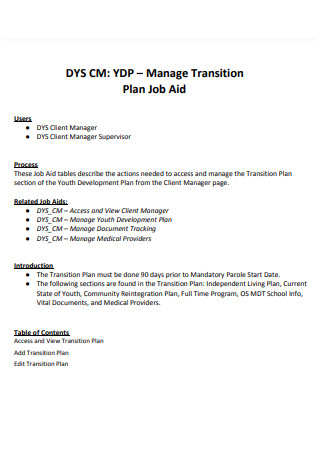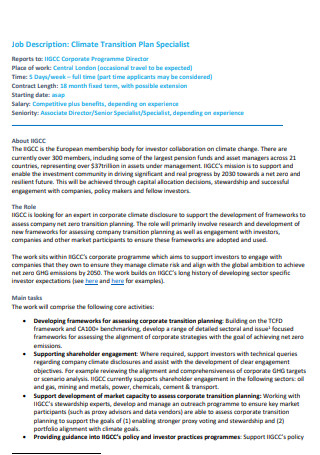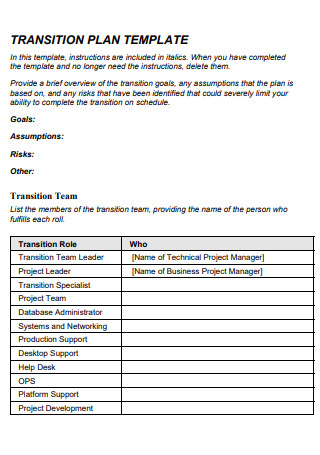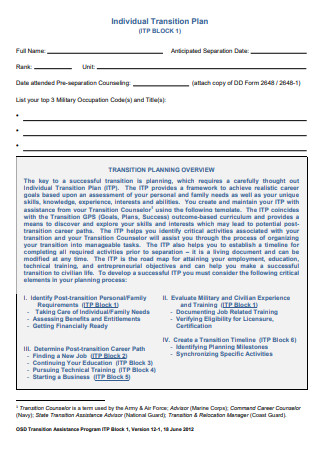3+ SAMPLE Job Transition Plan
FREE Job Transition Plan s to Download
3+ SAMPLE Job Transition Plan
What is a Job Transition Plan?
Why Do People Leave Their Job?
Advantages of Creating a Job Transition Plan
How to Prepare for a Job Transition
FAQs
Should I Make a Job Transition Plan Even if I’m Leaving?
What is the Purpose of a Transition Plan?
What Should I Do to Prepare For a Career Change?
What is a Job Transition Plan?
A job transition plan is a form or document that outlines the necessary steps to take about current and future tasks that must be prepared in case of a handover to make any type of transition simpler. It would serve as a sort of guide for anyone new to the role. Of course, that is not the only available detail in a transition plan. There could be specifics such as the new job description, what obligations needed to be completed before leaving that position, critical dates and projects to remember for the person replacing the post, and when the transition would take place. Whether you’re creating a transition plan template for leaving a job and seeking new opportunities, or a plan to help an employee transition to a new role, an interagency career transition assistance plan or a transition plan template for leaving employees that includes all of the procedures you must complete will make it easier for you to proceed.
Why Do People Leave Their Job?
Everyone has their own personal reasons for leaving a job, even though a new 2021 job satisfaction report from the Conference Board website shows a rise of around 14.3 percent from 2010 to 2020, making it the highest in 20 years. That would generally imply that there is a decreased likelihood of someone leaving their work due to discontent. However, the unpredictability of natural calamities or human tragedies may force someone to give in their resignation letter unexpectedly. Especially in these difficult times, the pandemic may have resulted in major layoffs or individuals suddenly working from home, to which not everyone could easily adapt. As a result, in order to better tackle the problems that lie ahead, it is essential to have a plan in place as a response to any challenges.
Advantages of Creating a Job Transition Plan
The more crucial a person’s role, the more duties they have. And if that person decides to quit or is promoted, there will be vacancies that must be filled by someone else. Whether it is the individual moving up with greater duties or merely the one filling that person’s shoes, a new role will undoubtedly cause someone to make more missteps if they are not prepared. Here are a few of the advantages of creating a job transition plan could offer.
How to Prepare for a Job Transition
A detailed and elaborate plan is the way to go when anticipating any form of change. So, let’s have a look at some tips for preparing for a job transition.
Tip 1: Understand Your Responsibilities.
This advice applies not only to new duties, but also to those you are relinquishing. Having a clear understanding of what is expected of you in your new positions and what the demands are will not only impress your superiors, but it will help alleviate the pressure of gaining new tasks. As a result, when you apply for a new job and write your curriculum vitae, the information on your previous position’s tasks is clearly described too.
Tip 2: Keep Updated Information.
Having a clear picture of your responsibilities is vital not only before and throughout your present job, but also after you leave. Someone who is going to fill your position will want all the assistance they can receive from someone with that job experience. And you are that person. The move will be much smoother for everyone concerned if both of you go through the handover process efficiently utilizing the work handover plan template. Bidding farewell to your new role and assisting someone else in doing a fine job with it has its own rewards, not only in the sense that you have the clean conscience of passing over your role with clear guidance, but it is also beneficial to build work relationships just by doing so.
Tip 3: Get Familiar With Any New Technologies and Techniques
As a result, when starting a new work, there is always the possibility to learn and grow and discover new skills that can be developed. However, in order to do so efficiently, it is important to first become acquainted with it. Knowing what you don’t know helps in the long run since it allows you to ask experts questions and make the adjustment to your new job easier because you are already aware of the tools and methods essential for you to acclimate to your new position.
Tip 4: Learn the Status of Newly Handed-over Projects.
Taking up a new job does not always imply embarking on new endeavors. It may also imply that you must perform the work and progress of a prior employee when you take on their role. That requires familiarizing yourself not only with your new workplace but also with any previous projects that may have been left behind. How else could you create your status report on ongoing projects if you don’t know what they are? Familiarizing yourself with the project’s progress may also aid in the development of friendship among your new coworkers.
Tip 5: Faithfully Follow the Process.
To avoid stumbling and becoming confused along the way, faithfully following the transition process may alleviate some of the stress of transitioning. Some, on the other hand, may be what the Human Resources Department would advise to follow because it is the procedure that has proven to be effective. And it may be necessary to actually follow the technique. So, for less bother on all sides, it’s best to stick to what’s written in the plan.
Tip 6: Updated Contact Details
While preparing for a new job, you may meet your new coworkers and leaders. As a result, your existing contact information from previous coworkers may no longer be valid. You may have new direct superiors to whom you must give your work status report. Understandably, transitioning to your new job status may raise questions, but knowing who to ask and contact may be beneficial. As a result, it is preferable that you have an up-to-date list of persons to whom you can address and convey your progress.
FAQs
Should I Make a Job Transition Plan Even if I’m Leaving?
The answer, one may respond, would most likely differ depending on the job description. Some people may be able to leave a job without having to go through a transition period. However, if your employment entails revolving around projects and research, particularly unfinished ones, there are existing obligations that should be passed on to the next. So yes, a job transition plan is recommended, especially for leaving employees in situations where inconvenient developments may arise.
What is the Purpose of a Transition Plan?
A transition plan may not be necessary for everyone, but it may be vital for someone due to the ease it provides. Having a written document with clear directions and details about what is advised action to do in order to smoothly progress with a new assignment helps not only your job but also everyone else’s job. Because any job which must be coordinated with someone else’s means that when a change occurs, adjustments must be made. As a result, a job transition plan would aid in adapting to the change and guiding a person into her future position.
What Should I Do to Prepare For a Career Change?
First and foremost, there is the risk of changing occupations, which should not be underestimated. Not only will your credentials and ability be called into question, but it will also be difficult to adjust to something completely new. Changing professions demands not just a change in the surroundings, work schedules, or job description, but it also entails asking the key question, “Why?” Because your new employer will question you after reviewing your résumé as to why you decided to change careers so abruptly. When these questions arise, it is essential to be prepared. Prepare to present your justifications for taking such drastic action. You should also be prepared to analyze the risks and benefits of changing careers extensively.
So, in conclusion, there are numerous factors that must be considered while starting a new work. Transitioning. Adjusting. Learning. We have a drive to accomplish greater things, and occasionally we take them spontaneously while ignoring the implications later on. But for something as significant as a job that may or may not determine our life in the future, accepting the challenges it presents, and most importantly, having a strategy in place would be ideal. So, if you are worried about transitioning to a new job, consider these transition plan samples we provide.




